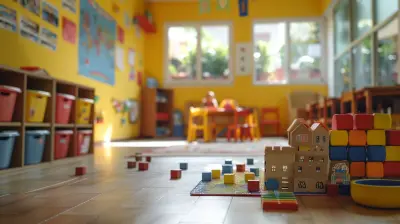Why Sleep Matters for Academic Performance
21 June 2025
Let’s be honest — sleep is often the first thing we sacrifice when school, life, and deadlines pile up. Burning the midnight oil might seem like a badge of honor, especially when you’ve got a big exam or a term paper due soon. But here’s the thing: cutting sleep is like trying to run a marathon on an empty stomach. You might get started, but you’re not going far — or fast.
Sleep isn't just a break for your body. It's brain fuel. And when it comes to academic performance, getting enough quality rest can be the game-changer that takes you from struggling to thriving.
In this article, we're gonna dive deep into why sleep matters for academic performance, how it affects your memory, focus, decision-making, and even your mood. Ready? Let’s get comfy under the blanket of knowledge and have a heart-to-heart about sleep.
The Science of Sleep: What’s Really Happening When You Snooze?
OK, first things first. Sleep isn’t just “off” time. It’s prime time for your brain.While you're catching Zs, your brain is busy sorting through everything you’ve taken in during the day — facts, formulas, new concepts, random trivia. It organizes, stores, and even throws out unnecessary stuff, like an overworked librarian filing thousands of books into the right shelves.
Think of your brain like a smartphone. When the memory gets full, it slows down, starts glitching, and struggles to operate. Sleep is like clearing up space and installing updates. Everything runs smoother afterward.
There are two key phases of sleep involved here:
- REM (Rapid Eye Movement) Sleep: Crucial for creativity, problem-solving, and emotional regulation.
- Non-REM Sleep (especially deep sleep): Vital for consolidating information into long-term memory.
You need both to function at your academic best.
How Sleep Affects Your Memory
Ever stay up all night cramming for a test, only to go blank the next morning?That’s your brain on zero sleep.
Memory has three stages:
1. Encoding – taking in information.
2. Consolidation – storing it.
3. Retrieval – recalling it when needed.
Here's the catch: if you skip sleep, consolidation fails. That means all those hours you spent studying? Wasted. Your brain literally didn’t get a chance to lock the info in. It’s like writing on a whiteboard with a damp marker.
Getting adequate sleep helps upgrade short-term memories into long-term storage. So yeah, that dream you had about your history professor riding a unicorn? Might have been your brain organizing everything you studied about the French Revolution.
Focus, Attention, and Your Cognitive Superpowers
You know that foggy feeling when you’ve slept like trash? Like, you can hear someone talking but can’t make sense of the words?That’s low sleep playing tricks on your focus.
When you're sleep-deprived, your attention span shortens — big time. It becomes harder to concentrate, process information, and stay alert. It's like watching a movie that keeps buffering. Frustrating, right?
Studies show that sleep-deprived students score lower on exams, are more likely to make mistakes, and take longer to complete tasks. Not exactly a winning combo.
And here's the kicker — it doesn’t take much. Even losing one or two hours of sleep a night for a week can mess you up cognitively, almost as badly as pulling an all-nighter.
Emotional Stability and Sleep — The Silent Academic Killer
Let’s get real. School isn’t just books and grades. It’s stress, deadlines, group projects, maybe a job on the side, and trying to have a life.Guess what helps you deal with all that? Yep — sleep.
Lack of sleep cranks up your emotional reactivity. Everything feels more stressful. Minor issues become major crises. You’re grumpier, more anxious, and less motivated. It's like going through your day with everything on "hard mode."
And let’s not forget the motivational hit. When you're tired, you’re more likely to procrastinate, skip assignments, or zone out in class (or during that three-hour Zoom lecture). Not the vibe you want.
Decision-Making and Creativity: The Sleep Advantage
Ever noticed how solving a problem after a good night’s sleep feels effortless?Sleep improves your higher-order thinking — aka the stuff that helps you interpret, analyze, and come up with new ideas. That’s gold when it comes to writing essays, solving complex math problems, or designing projects.
It also helps with decision-making. When you're sleep-deprived, your brain’s prefrontal cortex (the rational thinking part) works slower. Meanwhile, the amygdala (your emotional center) goes into overdrive. So you make impulsive decisions, forget details, and miss obvious stuff.
Not exactly ideal when you're juggling academic responsibilities.
The All-Nighter Myth: Debunked
Let’s talk about the infamous all-nighter.Sure, it feels productive. You’re powered by caffeine, adrenaline, maybe regret. You might even finish that project or read those 12 chapters.
But what do you lose?
Your memory takes a hit. Your ability to focus tanks. The next day, your performance drops like a rock. Studies show students who sleep after studying recall more than those who stay up all night.
Think of an all-nighter like sprinting at the start of a marathon — you’ll tire out fast, and it won’t get you to the finish line.
Do yourself a favor: study smart, sleep smarter.
Sleep and GPA: The REAL Connection
Let’s talk numbers.Research has consistently shown a direct link between sleep and GPA. Students who get 7–9 hours of sleep regularly have higher GPAs than those burning late-night oil.
Why?
Because with enough sleep, you retain more, focus better, stay emotionally balanced, and make better decisions. It’s the full toolkit for academic excellence.
So, if you're chasing an A but sleeping like a C student — it might be time to rethink your strategy.
Power Naps: Your Brain’s Secret Weapon
Can’t squeeze in 8 hours every night? We get it. Life happens.But don’t underestimate the power of a nap.
A 20–30 minute nap can boost alertness, learning capacity, and mood. It's like plugging your brain into a fast-charger. Just don't go overboard — longer naps can leave you groggy.
Pro tip: Use naps strategically — after classes, during study breaks, or before a late-night study session. It’s not lazy; it’s smart.
How to Improve Your Sleep Habits (Without Going Full Grandma Mode)
No need to overhaul your whole life. Small wins add up. Here are some doable sleep tips that actually work:- Stick to a Sleep Schedule: Go to bed and wake up at the same time every day — yes, even weekends.
- Power Down Screens Before Bed: Blue light messes with your melatonin (sleep hormone). Try reading or journaling instead.
- Create a Sleep-Friendly Space: Keep it dark, cool, and quiet. Invest in blackout curtains or a comfy pillow.
- Avoid Caffeine Late in the Day: That afternoon iced coffee might be sabotaging your night.
- Wind Down Properly: Don’t expect to crash right after studying. Give your brain time to chill.
Treat sleep like a class you can’t afford to skip.
Final Thoughts: Sleep Isn’t Optional — It’s Foundational
Look, we’ve all been there — tempted to trade sleep for just a little more study time, a few more scrolls through social media, or one more episode. But when it comes to your academic performance, sleep isn’t just another item on the wellness checklist. It’s the foundation everything else rests on.Want better grades? Focus more easily? Improve your mood? Master tough concepts? It all starts with enough solid sleep.
So next time you're choosing between another hour awake or turning in early, remember this: a well-rested brain is a high-performing brain.
Now turn off the lights, put down your phone, and get some rest. Your GPA will thank you.
all images in this post were generated using AI tools
Category:
Student SuccessAuthor:

Madeleine Newton
Discussion
rate this article
2 comments
Martha McLoughlin
This article effectively highlights the crucial connection between sleep and academic performance. Prioritizing adequate rest not only enhances cognitive functions but also promotes overall well-being, ultimately leading to better learning outcomes for students. Great insights!
September 25, 2025 at 2:21 AM

Madeleine Newton
Thank you for your thoughtful comment! I'm glad you found the connection between sleep and academic success insightful. Prioritizing rest is indeed essential for optimal learning.
Alice McQuillan
This article highlights a crucial yet often overlooked aspect of learning. Sleep truly influences cognitive abilities and academic success. Prioritizing rest is essential, not just for students, but for lifelong learners.
June 27, 2025 at 4:17 AM

Madeleine Newton
Thank you for your insightful comment! I completely agree—prioritizing sleep is essential for optimizing cognitive function and academic success for everyone.


